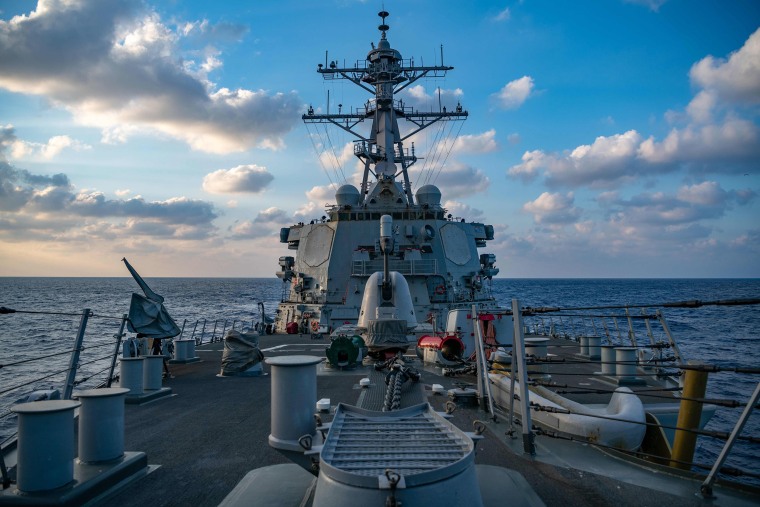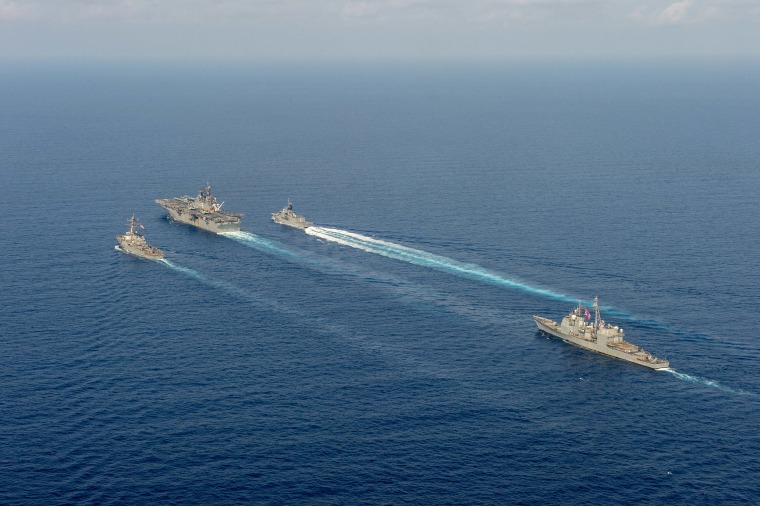China says it 'expelled' U.S. Navy vessel from South China Sea
https://www.nbcnews.com/news/world/china-says-it-expelled-u-s-navy-vessel-south-china-n1196261
"The
provocative actions of the United States seriously violated relevant
international law norms," a spokesman for China's military said.

By Adela Suliman
China's
military has said it "expelled" a U.S. navy vessel from the hotly
contested waters of the South China Sea this week. It said the "USS
Barry" had illegally entered China's Xisha territorial waters on
Tuesday.
China's Southern Theater army
command "organized sea and air forces to track, monitor, verify, and
identify the U.S. ships throughout the journey, and warned and expelled
them," said Chinese military spokesperson Li Huamin, in a statement.
"The
provocative actions of the United States seriously violated relevant
international law norms, seriously violated China's sovereignty and
security interests, artificially increased regional security risks, and
were prone to cause unexpected incidents," he said.
NBC News reached out to American officials who were not immediately available for comment overnight.
The South China Sea
is a potentially energy-rich stretch of water and home to more than 200
specks of land. It serves as a gateway to global sea routes where
approximately $3.4 trillion of trade passes annually.
The
numerous overlapping sovereign claims to islands, reefs and rocks —
many of which disappear under high tide — have turned the waters into a
zone of competing diplomatic interests, embroiling neighbors. Beijing
holds the lion's share of these features with approximately 27 outposts
peppered throughout.
Tension has been simmering in the South China Sea, of late, particularly between China and its Asian seafaring neighbors Malaysia and the Philippines.
This month Vietnam also lodged an official protest with China,
following the sinking of a Vietnamese fishing boat it said had been
rammed by a Chinese maritime surveillance vessel near the Paracel
Islands, in the South China Sea. China denied the claims and said the
Vietnamese boat had illegally entered the area to fish and refused to
leave.
Earlier this month, Secretary of
State Mike Pompeo told his Southeast Asian counterparts that China was
taking advantage of the world’s preoccupation with the coronavirus pandemic to push its territorial ambitions in the South China Sea.
"Beijing
has moved to take advantage of the distraction, from China’s new
unilateral announcement of administrative districts over disputed
islands ... its sinking of a Vietnamese fishing vessel earlier this
month, and its ‘research stations’ on Fiery Cross Reef and Subi Reef,"
Pompeo said in a video meeting with the foreign ministers of the
10-member Association of Southeast Asian Nations (ASEAN) on April 23.
Pompeo
also accused China of deploying militarized ships to intimidate other
claimant countries from developing offshore gas and oil projects in the
region.
Last week, the U.S. Navy said it had partnered with the Australian navy for operations in the South China Sea, which began April 13.
"To
bring this much combat capability together here in the South China Sea
truly signals to our allies and partners in the region that we are
deeply committed to a free and open Indo-Pacific," said Rear Adm. Fred
Kacher, commander of the America Expeditionary Strike Group, in a
statement.
The U.S. 7th Fleet
is the U.S. Navy’s largest numbered fleet and routinely conducts
operations in the Indo-Pacific area. It has said that all of its
interactions during freedom of navigation movements have been in
accordance with international norms.
The U.S. Navy has previously stated
that sweeping maritime claims in the South China Sea posed a serious
threat to freedom of the seas and the right of innocent passage of all
ships.

China
has maintained that it has historical sovereign rights in the South
China Sea, which neighboring countries have disputed. In this latest
interaction, China said the U.S. was not acting "in line" with the
wishes of other countries in the region, which want to "maintain peace
and stability in that area."
Spokesperson Li also urged the U.S. to instead focus on its national COVID-19 crisis.
"We
urge the United States to focus on the prevention and control of its
national epidemic situation, do more useful things for international
anti-epidemic efforts, and immediately stop military operations that are
not conducive to regional security, peace and stability," he said.
The coronavirus pandemic has been a growing source of tension between the world's two largest economies, with both Washington D.C. and Beijing heaping criticism on each others' handling of the outbreak.
Li
added that Chinese forces would continue to "resolutely perform their
duties" in the South China Sea to "firmly maintain peace and stability."
The Associated Press contributed to this s

